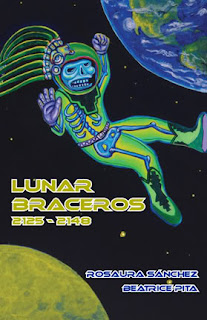Though science fiction plays an integral role in American letters, few Latino writers have ventured into the field. That makes "Lunar Braceros 2125-2148" by Rosaura Sánchez and Beatrice Pita (Calaca Press, $15 paperback) a bit of a rarity. But it must also be celebrated as an excellent example of political critique.
The year is 2148, the tricentennial of the Treaty of Guadalupe Hidalgo, though this anniversary no longer holds much relevance. In the age of the New Imperial Order, global economic powers have remapped the Americas into nation-states. The history of this "new political re-alignment" is presented to 18-year-old Pedro in the form of "nanotexts with lunar posts, lessons, bits and pieces of conversations, and notations" in an effort by his mother, Lydia, to help him understand the world he was born into.
Pedro learns about the creation of Cali-Texas and its 20th-century roots to a proud Chicano people. But hard times crippled the nation-state, prompting a tough solution: It rounded up the unemployed and homeless into reservations, "a type of population control camp mechanism."
And when Cali-Texas expanded to include parts of Canada and Mexico, becoming a Latino-identified nation-state, the exploitation of the work force intensified. The reservations became no less than prisons supplying cheap labor to any enterprise seeking a part of Earth's dwindling natural resources.
With advances in space travel came a need for moon-based miners and technicians (called "tecos"). That launched a lunar bracero program that included Pedro's mother, a gifted teco who could "code, decode, and recode any computer language." But what began as a promising prospect - for the tecos to make enough money to move their families out of the reservations - soon turns into threat of extermination, as details emerge about the fates of the first generation of braceros who reached the moon and never returned to Earth.
Pedro's mother, and the rest of the tecos, stage an escape from the moon to become part of an insurrection. Pedro reaches the end of the nanotexts with no clear answers about their fate, but it is clear that the purpose of the history has been consciousness-raising. After absorbing the dispatches, Pedro grows up and is ready to join the revolution.
Sánchez and Pita have constructed an inventive and prophetic allegory about the troubles that await an economy that cannot sustain a capitalist model without abuses to its beleaguered land and population.
There is no guesswork, however, in the knowledge that the downtrodden will rise up and resist - that's a lesson from the past.
"Lunar Braceros 2125-2148," a unique and timely addition to Chicano letters, is full of points to ponder, many coming from Lydia, the wise Latina of the future: "There is this need for freedom that never leaves you. It can become more important even than survival."
Rigoberto González is an award-winning writer living in New York City. His website is www.rigobertogonzalez.com, and he may be reached at Rigoberto70@aol.com.


No comments:
Post a Comment